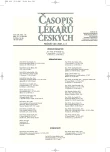-
Medical journals
- Career
Polycystic Ovary Syndrome in 2006
Authors: J. Vrbíková; B. Bendlová
Authors‘ workplace: Endokrinologický ústav, Praha
Published in: Čas. Lék. čes. 2007; 146: 218-222
Category: Review Article
Overview
Polycystic ovary syndrome was defined as the combination of anovulation and hyperandrogenaemia (NIH 1990). Another definition used the combination of ultrasonographic appearance of polycystic ovaries and/or anovulation and/or hyperandrogenaemia or cutaneous manifestations of hyperandrogenism (Rotterdam). The population defined according to NIH is probably in greater risk of insulin resistance and obesity. Pathogenesis of PCOS is not clear till now. Dysregulation of ovarian steroidogenesis could be one of the causes of the full-blown syndrome. Up-regulation of steroidogenic enzymes, probably due to the exaggerated expression of transcription factors such as GATA-6 or retinoids could be involved. Insulin sensitisators are now widely used in the therapy. They could beneficially modify not only insulin resistance and dyslipidaemia, but also ovarian and adrenal steroidogenesis. Metformin and glitazones improve anovulation however the studies conducted till now were not representative concerning the point of successful pregnancy.
Key words:
polycystic ovary syndrome, steroid hormone, insulin resistance, metformin.
Labels
Addictology Allergology and clinical immunology Angiology Audiology Clinical biochemistry Dermatology & STDs Paediatric gastroenterology Paediatric surgery Paediatric cardiology Paediatric neurology Paediatric ENT Paediatric psychiatry Paediatric rheumatology Diabetology Pharmacy Vascular surgery Pain management Dental Hygienist
Article was published inJournal of Czech Physicians

-
All articles in this issue
- The Polycystic Ovary Syndrome and Its Male Equivalent
- Polyglandular Activation of Autoimmunity as a Manifestation of Subclinical Endocrinopathies
- Evaluation of Results of Iodine Prophylaxis in Czech Republic
- Diabetes Mellitus in Adult Patients with Type 1 Diabetes Shows Immunological, Functional and Clinical Differences Depending on the Presence of Autoimmune Thyroiditis
- Endocrine Orbitopathy and Significance of Autoantibodies Against 1D Protein
- Influence of Early Postnatal Nutrition in Preterm Infants on Their Anthropometric and Hormonal Characteristics at the Age of 10 Years
- Relationships Between the „Eating Inventory“ Factors, Socioeconomic Status, Anthropometric Body Adiposity Indexes and Health Risks in Czech Population
- Levels of Hormones in Plasma and in Synovial Fluid of Knee Joint of Patients with Rheumatoid Arthritis
- The Institute of Endocrinology Celebrates its 50th Anniversary. How is the Institute Poised for the Next 50 Years?
- Half Century of the Continuation of the Institute of Endocrinology in Prague
- History, Presence and Trends of Steroid Endocrinology
- Study of the Genetic Causes of Polygenetically Determined Endocrinopathies – Patience Can Bring Success
- Growth Hormone Treatment in the Institute of Endocrinology
- The Role of Complement in Autoimmune Thyroid Disorders
- Quality of Life in the Patients with Disorders of Sexual Development and with Y Chromosome in Karyotype
- Polycystic Ovary Syndrome in 2006
- Neurosteroids and Their Function
- Regulatory Network of Transcription Factors: Their Key Role in the Development and Function of Pancreas
- Genetic Background of Mitochondrial Diabetes
- Obesity Based on Mutation of Genes Involved in Energy Balance
- Osteoporosis and Aterosclerosis – is there Any Pathogenetic Association?
- Journal of Czech Physicians
- Journal archive
- Current issue
- Online only
- About the journal
Most read in this issue- Neurosteroids and Their Function
- Relationships Between the „Eating Inventory“ Factors, Socioeconomic Status, Anthropometric Body Adiposity Indexes and Health Risks in Czech Population
- Obesity Based on Mutation of Genes Involved in Energy Balance
- Growth Hormone Treatment in the Institute of Endocrinology
Login#ADS_BOTTOM_SCRIPTS#Forgotten passwordEnter the email address that you registered with. We will send you instructions on how to set a new password.
- Career

